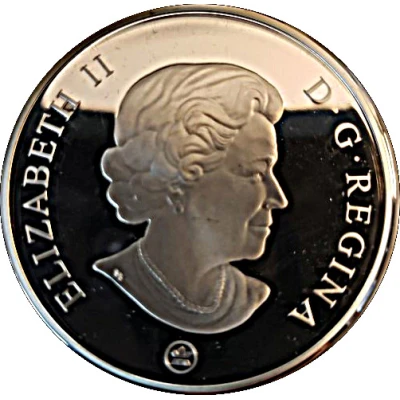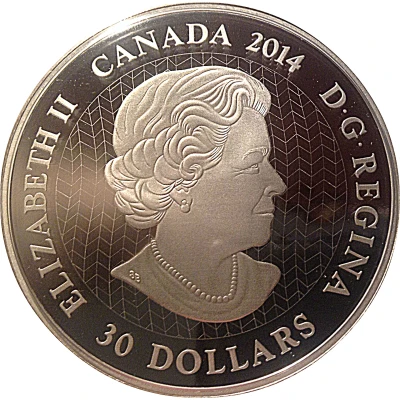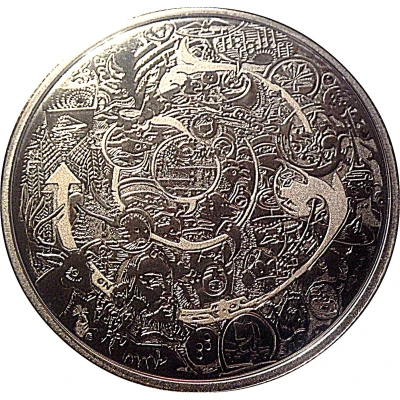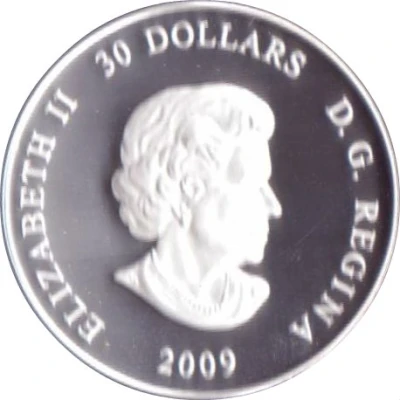
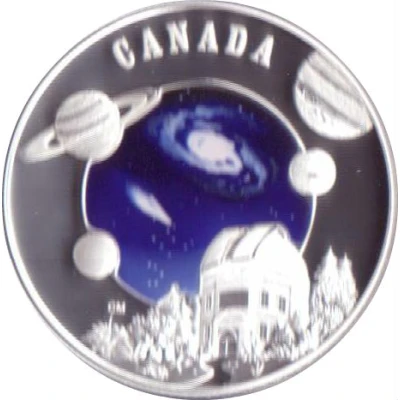

© Wolfy
30 Dollars - Elizabeth II Astronomy
2009 year| Silver (.925) | 33.75 g | 40 mm |
| Issuer | Canada |
|---|---|
| Queen | Elizabeth II (1952-2022) |
| Type | Non-circulating coin |
| Year | 2009 |
| Value | 30 Dollars 30 CAD = USD 22 |
| Currency | Dollar (1858-date) |
| Composition | Silver (.925) |
| Weight | 33.75 g |
| Diameter | 40 mm |
| Thickness | 2.9 mm |
| Shape | Round |
| Technique | Milled |
| Orientation | Medal alignment ↑↑ |
| Updated | 2024-10-04 |
| Numista | N#31652 |
|---|---|
| Rarity index | 89% |
Reverse
An observatory with a universe of wonders shimmering within and around the beautifully painted night sky.
Script: Latin
Lettering:
CANADA
CM
Engraver: Stan Witten
Designer: Colin Mayne
Edge
Reeded
Comment
A universe beyond our own. Ever since prehistoric times, mankind has been in awe of the astonishing immensity of the heavens. The earliest civilizations told countless legends of magical powers and creatures ruling from the heavens. The monoliths of Stonehenge... the pyramids of Egypt... ancient sites the world over bear witness to mankind's desire to see further - and to understand.Over the centuries, scientists observed and schematized, transcribed and theorized. Until 1609, when Galileo Galilei observed the heavens through his telescope. He saw that the moon, far from being smooth, was covered with craters. He discovered Jupiter's four moons and Saturn's rings. He also came to the conclusion that the Milky Way was made up of stars, and advanced the study of sunspots. According to some, Galileo's telescope represents the genesis of modern scientific instruments, opening the door to a new era that brought about a gigantic leap forward in mankind's perceptions, far beyond the boundaries of the earth.
Before the end of the 17th century, new concepts such as the speed of light and universal gravity were discovered. By the 1890s, the foundations of aerospace were taking shape, less than a century before the first object was put into orbit around the earth. In the blink of an astronomical eye, humans walked on the moon and space probes explored every planet in the solar system.
For four hundred years, Galileo's vision of the possibilities of evidence-based scientific research enriched our understanding of the natural world. And thanks to cutting-edge technologies, the great intergalactic adventure that is astronomy has become increasingly accessible, encouraging large numbers of people to delve into its mysteries. The famous Canadian astronomer and educator Helen Sawyer Hogg reminds us that "the stars belong to everyone".
Interesting fact
One interesting fact about the $30 Elizabeth II (Astronomy) 2009 silver coin from Canada is that it features a unique reverse design that showcases a stunning representation of the Milky Way galaxy, along with the constellations of Orion, Cassiopeia, and Ursa Major. The design is meant to symbolize Canada's contributions to astronomy and the exploration of the universe.
Price
| Date | Mintage | VG | F | VF | XF | AU | UNC |
|---|---|---|---|---|---|---|---|
| 2009 | 7174 | - | - | - | - | - | - |
Values in the table are based on evaluations by sales realized on Internet platforms. They serve as an indication only for 30 Dollars - Elizabeth II (Astronomy) 2009 coin.
